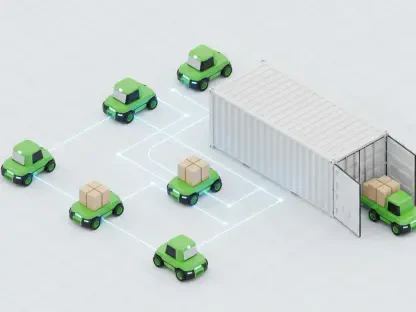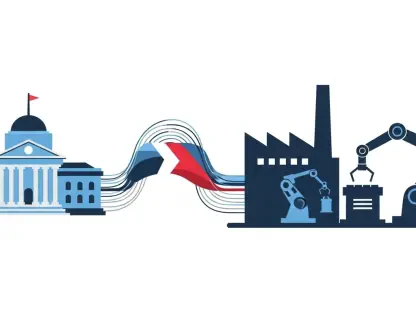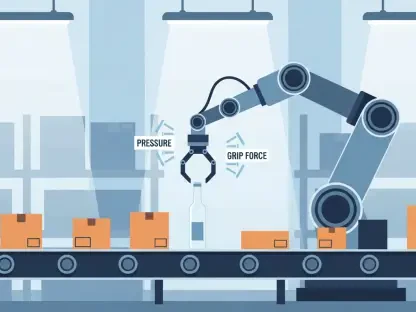The landscape of fleet management is undergoing a significant transformation, driven by technological advancements and a growing focus on green initiatives. Companies within the transportation, logistics, and petrochemical industries are adapting to these changes by embracing digital solutions and innovative green technologies. These developments are not only enhancing operational efficiency but are also paving the way for a more sustainable future.
Technological Advancements in Fleet Management
Electronic Driver Vehicle Inspection Reports (eDVIR)
Penske has introduced an electronic Driver Vehicle Inspection Report (eDVIR) feature in its driver app, marking a significant shift towards digitization in fleet management. This innovation streamlines the inspection process by allowing drivers to complete vehicle inspections electronically. The eDVIR ensures that critical maintenance issues are promptly addressed, enhancing both efficiency and compliance.
By digitizing the inspection process, Penske aims to maximize data accuracy and minimize errors associated with manual entries. This technology simplifies the communication of maintenance needs and enhances overall vehicle safety. The eDVIR feature reflects the industry’s broader trend towards leveraging technology to improve fleet operations. What once required tedious, manual documentation can now be accomplished faster and with fewer errors, inevitably enhancing the safety and operational efficiency of the fleets.
The transition to an electronic reporting system optimizes fleet operations substantially. It allows fleet managers to receive real-time data, making it easier to track vehicle conditions and maintenance requirements. This level of insight helps in proactively addressing issues before they escalate, reducing downtime, and ultimately fostering a safer and more reliable transport environment. Moreover, the eDVIR system aids in regulatory compliance, as electronic records are easier to manage and retrieve, ensuring that critical safety inspections are never overlooked.
Electric Auxiliary Power Units (APUs)
Highway Transport’s decision to equip its fleets with electric Auxiliary Power Units (APUs) is a testament to the growing adoption of green technologies. Electric APUs handle auxiliary functions without relying on the primary engine, significantly reducing emissions and fuel consumption. This move aligns with the industry’s commitment to reducing carbon footprints and enhancing energy efficiency.
Electric APUs contribute to lower operational costs and improved environmental sustainability. By reducing the reliance on traditional fuel-powered engines for auxiliary functions, companies can achieve substantial savings while also supporting green initiatives. This technology represents a practical step towards a more sustainable future in fleet management. Moreover, the reduction in fuel consumption translates to fewer greenhouse gas emissions, making a notable positive impact on the environment.
The advantages extend beyond environmental benefits; electric APUs also reduce engine wear and tear, leading to lower maintenance costs and longer vehicle lifespans. As the transportation industry shifts towards more eco-friendly practices, electric APUs stand out as a practical, effective solution. These units underscore the significance of integrating green technology into fleet management, effectively balancing operational efficiency and environmental responsibility.
Expansion and Strategic Acquisitions
7-Eleven’s Diesel Network Expansion
7-Eleven’s plan to expand its 7FLEET diesel network underscores the company’s strategic positioning within the fuel supply chain. This expansion aims to enhance accessibility and convenience for fleet operators, addressing the growing demand for reliable fuel supplies. By increasing the reach of its diesel network, 7-Eleven is positioning itself as a key player in the fuel market.
The expansion of 7FLEET highlights the importance of a robust fuel supply chain in fleet management. Reliable fuel availability is crucial for the smooth operation of transportation and logistics services. 7-Eleven’s initiative reflects a strategic approach to meeting the evolving needs of the industry. This expansion is not merely about increasing fuel supply; it also signals a commitment to providing comprehensive support for fleet operators, ensuring they have ready access to essential resources.
In expanding its diesel network, 7-Eleven is likely to invest in additional infrastructure and technology to manage the increased demand efficiently. This move could result in improved service levels, reduced downtime for fleet operators, and greater overall satisfaction among clients. By strategically increasing its diesel network footprint, 7-Eleven is not only enhancing its market position but also significantly contributing to the reliability and efficiency of fleet operations across the regions it serves.
Palmdale Oil’s Acquisition of Maassen Oil Company
The acquisition of Maassen Oil Company by Palmdale Oil signals a trend towards consolidation within the oil and fuel industries. Mergers and acquisitions are often aimed at combining resources, expanding market reach, and optimizing operational efficiencies. This strategic move is expected to strengthen Palmdale Oil’s market position and enhance its service offerings.
By integrating Maassen Oil Company’s assets and expertise, Palmdale Oil can provide more comprehensive solutions to its customers. Consolidation within the industry allows companies to leverage economies of scale and improve competitiveness. This acquisition demonstrates the ongoing evolution of the oil and fuel sector in response to market demands. Such mergers are likely to result in a more streamlined, efficient operation that can better meet the diverse needs of its client base.
Moreover, the acquisition is expected to result in better resource allocation and enhanced service offerings, providing clients with more robust and effective solutions. It also reflects Palmdale Oil’s strategic approach to growth, combining both organic expansion and opportunistic acquisitions to fortify its market position. This strategic focus ensures that the company remains agile and responsive in an ever-evolving industry landscape.
Safety and Training Initiatives
RegO’s Propane Training Center
RegO’s establishment of a propane training center reflects an increased focus on safety and expertise within the propane industry. The training center is designed to offer specialized training programs, ensuring that industry standards are met and safety protocols are rigorously followed. This initiative aims to mitigate risks associated with propane handling and usage.
Specialized training centers like RegO’s are essential for maintaining high safety standards in the industry. By providing comprehensive training, companies can ensure that their workforce is equipped with the necessary skills and knowledge to handle propane safely. This focus on safety underscores the industry’s commitment to protecting both workers and consumers. Rigorous training programs can significantly reduce the incidence of accidents and ensure compliance with stringent industry regulations.
Furthermore, the training center can serve as a hub for ongoing education and skill development, helping industry professionals stay updated with the latest safety practices and technological advancements. This commitment to continuous improvement not only enhances workplace safety but also promotes operational excellence. As the propane industry evolves, initiatives like RegO’s training center play a pivotal role in ensuring that safety remains a top priority.
Safe Fleet’s Service Extension to Houston
Safe Fleet’s extension of its commercial vehicle (CV) service to Houston highlights the company’s dedication to enhancing safety and maintenance services within transport fleets. This expansion aims to provide better support and service coverage, ensuring improved maintenance and operational safety for commercial vehicles in the region.
The extension of Safe Fleet’s services is a strategic move to address the growing demand for reliable maintenance solutions. By enhancing service coverage, Safe Fleet can offer more comprehensive support to fleet operators, contributing to safer and more efficient fleet operations. This initiative aligns with the industry’s emphasis on safety and reliability, ensuring that fleet operators have access to top-tier services wherever they operate.
In addition to increasing geographical reach, Safe Fleet’s expansion likely involves the introduction of advanced maintenance technologies and practices. Such advancements can lead to more proactive maintenance strategies, reducing vehicle downtime and operational costs. By bolstering its presence in Houston, Safe Fleet is not just expanding its market footprint but also reinforcing its commitment to safety and quality in fleet operations.
Leadership and Organizational Changes
Depot Connect’s New CEO
The appointment of a new CEO at Depot Connect signals potential shifts in strategic direction and company priorities. Leadership changes often bring new visions and strategies aimed at maintaining a competitive edge and driving growth. The new CEO’s leadership is expected to influence the company’s approach to evolving market dynamics.
Leadership transitions can significantly impact a company’s strategic trajectory. With a new CEO at the helm, Depot Connect may explore innovative solutions and pursue new opportunities within the industry. This change represents a dynamic aspect of organizational development in fleet management. Fresh leadership can drive transformative initiatives, inspiring the organization to adapt and thrive in a rapidly changing market landscape.
Moreover, a new CEO often brings a renewed focus on customer-centric strategies, operational efficiencies, and technological advancements. This could result in revamped business models and improved service offerings, aimed at maximizing growth and client satisfaction. In an industry as dynamic as fleet management, effective leadership is crucial for navigating complex challenges and seizing emerging opportunities.
Industry Advocacy and Mental Health Focus
The landscape of fleet management is experiencing a profound evolution, spurred by rapid technological advancements and an increasing emphasis on sustainability. Key sectors such as transportation, logistics, and petrochemicals are at the forefront of this transformation, adopting a variety of digital solutions and cutting-edge green technologies. The integration of these innovative tools is not only boosting operational efficiency but also promoting a more sustainable and environmentally friendly future.
Digital technologies, like cloud computing and IoT, enable real-time monitoring and data analytics, providing fleet managers with critical insights that enhance decision-making processes. Automation and AI are also playing pivotal roles, streamlining operations and reducing human error. In parallel, advancements in green technologies, such as electric and hybrid vehicles, are reducing carbon footprints and diminishing reliance on fossil fuels. These changes are helping companies meet stringent environmental regulations and appeal to eco-conscious consumers.
By embracing these innovations, organizations are cultivating a more resilient, efficient, and sustainable fleet management ecosystem.









